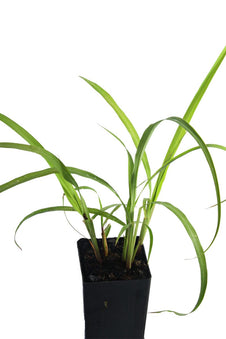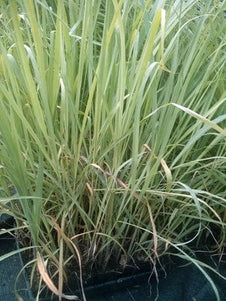





Lemongrass
Lemongrass

- In stock, ready to ship
- Inventory on the way

Usually available: All year
Life cycle: Perennial
Height: 90cm - 1.5m
Position: Sun / part shade
Soil preference: Moist / well drained
This is how we pack and send your Herb Plants to all states except TAS & WA
You will receive
- 1 Lemon Grass Herb Plant in a 50 X 75mm tube - General growing instructions
All of our Herb Plants are grown organically with certified organic potting mixes and fertilizers
Botanical Name: Cymbopogon citratus
A tall perennial grass with a thick clumping habit and a distinct Lemon flavour. It is native to south east asia. In Vietnam it is grown around the houses to keep away snakes.
Lemongrass is an essential ingredient to many Asian dishes. The leafy tips can be used for tea (hot or cold) use up to 1 tbsp of chopped leaf to a cup of boiling water. The lower part of the stem is used in cooking, cut the stem about 1 cm from the base, using the base up to where the leaves separate, remove the two outer layers, bash with the back of a knife or a pestle then slice thinly, you can go one step further and pound it in a mortar and pestle. You can also put the stalk in whole after bruising and remove before serving. Use in stir-fries, soups, curries, sauces and syrups.
Lemongrass has antibacterial, antifungal, and fever-reducing effects. As a tea, lemongrass can be used to give relief for stomachaches, diarrhea, gas, bowel spasms, vomiting, fever, the flu, and headaches and other types of pain.
Externally an infusion or the essential oil can be used for fungal problems such as tinea.
Growing Conditions
Lemon grass prefers rich moist soil and partial shade. It can tolerate direct sunlight but plants grown in shade tend to have softer greener leaves. Lemon grass can be lifted and divided in spring, cut the leaves back to a couple of centimetres above the roots when dividing.
Research
In 2006 a research team from the Ben Gurion University in Israel found that lemon grass (Cymbopogon citratus) caused apoptosis (programmed cell death) in cancer cells. Through in vitro studies, the researchers examined the effect of citral, a molecule found in lemon grass, on both normal and cancerous cells. Using concentrations of citral equivalent to the quantity in a cup of tea (one gram of lemon grass in hot water), the researchers observed that citral induces programmed cell death in the cancerous cells, while the normal cells were left unharmed.
All information provided on this website is for informational purposes only. Please seek professional advice before commencing any treatment.





